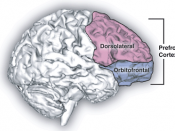Memory refers to the capacity to retain and retrieve information, and also to the structures that account for this capacity. When you can not retrieve something or distinguish what you originally heard or experienced it is known as source amnesia. False memories of events or experiences occur when we think about the event many times, it contains a lot of detail in our mind, it is very easy to imagine, and when you can focus your emotional reactions to the event rather then on what actually happened.
Conscious, intentional recollection of an event or of an item of information is called explicit memory. It is usually measured in one of two ways. The first is called recall, the ability to retrieve and reproduce from memory previously encountered material. Essay, fill-in-the-blank, and memory games are an easy example of this. The other test is called recognition. It is the ability to identify previously encountered material.
True-false and multiple choice tests are familiar examples.
Implicit memory or unconscious retention in memory, is evidenced by the effect of a previous experience on current thoughts or actions. To get this subtle sort of knowledge researchers must rely on indirect methods. The first is called priming. A person will read or listen to information and is later tested to see whether the information affects performance on another type of task. The second method is relearning method. It measures the retention that compares the time required to relearn material with the time used in the initial learning of the material.
The parallel distributed processing or PDP is an alternative to the information-processing model of memory, in which knowledge is represented as connections among thousands of interacting processing units, distributed in a vast network, and all operating in parallel.
There are three types of memory. The first...


